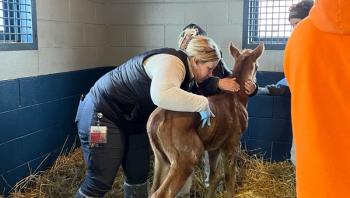
Career: It's a matter of choice
Veterinary students can choose many career paths upon graduation and with severe shortages in some areas, it might be worth taking a look at the road less traveled.
Columbus, Ohio — Veterinary students can choose many career paths upon graduation and with severe shortages in some areas, it might be worth taking a look at the road less traveled.
Don't limit success: Cindy Lovern, DVM and Banfield recruiter, tells students additional certification, degrees make you more desirable to future employers.
Lectures during last month's Student American Veterinary Medical Association's (SAVMA) 2009 Symposium in Columbus focused on some of the areas in veterinary medicine that are facing extreme shortages, such as food-animal, laboratory animal medicine and public health.
With some 80 percent of new grads entering private practice, some experts want you to consider all the options. An example?
About 2,000 laboratory animal veterinarians are needed nationwide, says Dr. Judy Hickman-Davis, director of the lab animal training program at The Ohio State University College of Veterinary Medicine, but less than 800 are now qualified members of the American College of Laboratory Animal Medicine (ACLAM).
Veterinarians are highly desired in research because of their ability to see the "big picture," and salaries among lab animal veterinarians can be very competitive, like say, $70,000 per year. Plus, with the shortage, Hickman-Davis says students who go into this field now will find it is very accessible.
Survival after vet school tip: When consolidating student loans after graduation, keep at least one loan out of the consolidated package. You can only consolidate once, but if you keep one out, you can consolidate that with the previously consolidated loan if a lower interest rate becomes available. - Cindy Lovern, DVM
Laboratory animal medicine, however, like many other specialized practice areas, requires additional training. A training program running about two years, or six years of equivalent field experience, is required, and candidates for ACLAM must have published a first author original article.
Other options may not require such specialized certification, though. Dr. Cindy Lovern, who now helps Banfield recruit new DVMs, says various graduate programs can help give students an edge, even in clinical practice, and set the stage for additional degrees after that.
Some areas where it may be beneficial to get additional certifications while you're in school already and don't have to pay additional tuition could include foreign animal disease, animal welfare, public health and zoonosis, business management, immunology and parasitology, Lovern explained.
"Those letters mean you've achieved a goal of getting another degree," she says, adding they all can be of use in practice. Plus, any of these programs will make you a more attractive candidate to future employers.
And being more marketable helps when it comes to salary negotiations. Even those heading toward specialization usually start in clinical practice to gain some experience, at least for a year or two, says Hickman-Davis. And that year or two is crucial to setting yourself up for a fruitful career, Lovern says, using her own experiences as an example.
Lovern graduated veterinary school with $68,000 in debt. She consolidated her loans at an interest rate of 6 percent and had the choice of making $1,000 monthly payments for 10 years or $411 monthly payments for 25 years. Interest rates are lower now, she pointed out, but debt levels are much higher.
With expenses, including car, home, groceries, credit cards and other living expenses and a starting income of about $4,000 per month, there won't be much left after bills, even if a starting salary of $80,000 sounds great at graduation. The mistakes many students make in finding their first job is not negotiating a high enough salary, she says.
"When you negotiate a salary, make sure you know what you need," Lovern explains.
Don't take loans you don't need to try and keep debt levels down, she says, and look for programs where you can be paid for your education.
"More and more people are willing to pay for the veterinarians they need, like food-animal vets," says Lovern, adding that even if it's not your first choice at a career path, it might not be bad to switch tracks for something more lucrative.
"I don't think any experience you get is a bad one," she says. "Look at your long-term goals."
Flexible scheduling, benefits, mentoring, financial freedom, work/life balance and time-off policies all are things to consider when choosing a career path in veterinary medicine.
Lovern, who has worked in small-animal clinics and for the American Veterinary Medical Association, says her job recruiting for Banfield is the best for her situation right now, because it allows her to work from home and spend more time with her children.
Knowing your value and being able to back up what you claim to be worth are critical in getting what you want out of any situation, though, she says.
Hickman-Davis agrees, saying her salary and schedule in laboratory animal medicine is preferable in her eyes to her colleagues working in clinical medicine because her weekends.
And with more women entering practice, Lovern says employers are going to have to get used to offering more flexible packages to attract the best employees.
Newsletter
From exam room tips to practice management insights, get trusted veterinary news delivered straight to your inbox—subscribe to dvm360.






